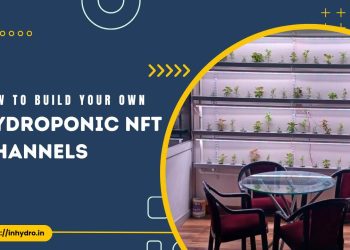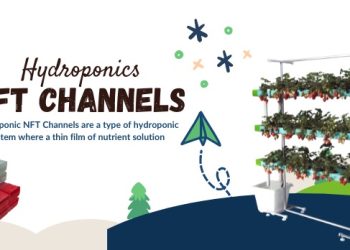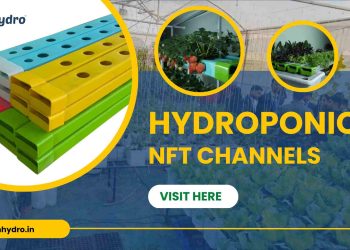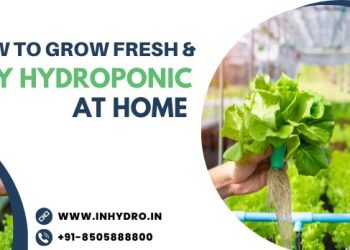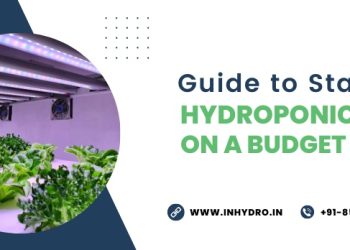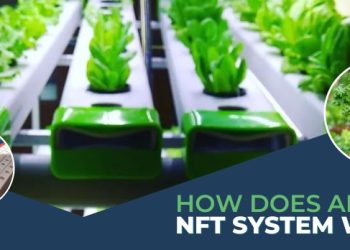- 08/01/2023
- Posted by: Shamsher Raza
- Category: Hydroponics
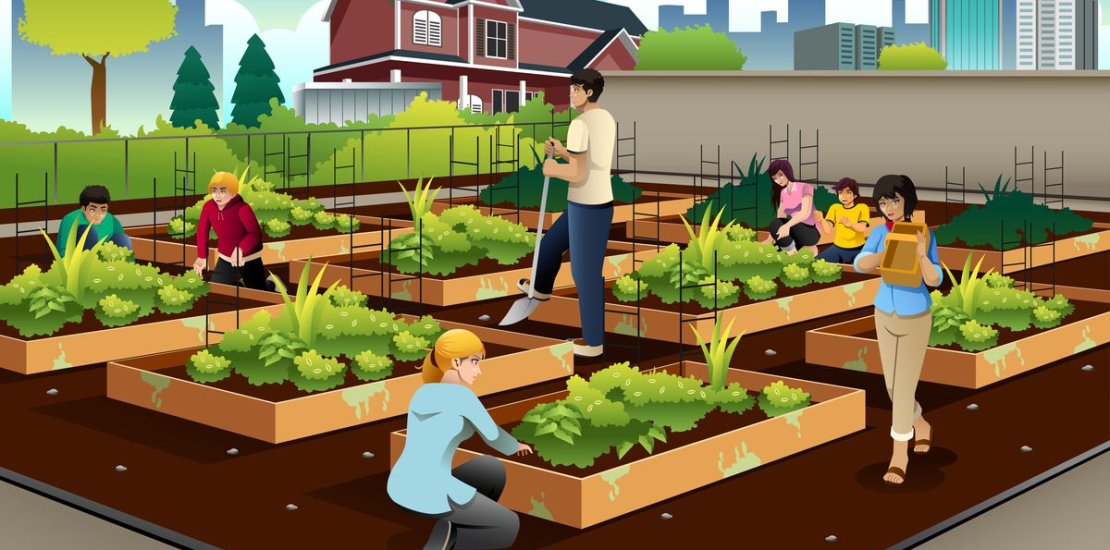
HYDROPONICS: The Future of Urban Agriculture
Urban farming is becoming increasingly popular as more people are realizing the importance of locally-grown food. One of the most exciting developments in the urban farming movement is hydroponics, which uses nutrient-enriched water to grow plants without soil. This method of farming has become increasingly popular because of its many benefits, such as its ease of use and its minimal impact on the environment. In this blog post, we will discuss the potential of hydroponics to revolutionize urban farming and how it can be used to create a more sustainable food system.
Benefits of Urban Hydroponics
Reduced Fossil emissions:
Hydroponic systems operating in urban areas bring food supply closer to consumers. It cuts back on transport emissions generated along the supply chain.
Less contamination:
Using herbicides and pesticide in traditional farming contributes to air pollution and soil contamination. Hydroponic systems eliminate the problem of weed growth which, in turn, means zero herbicides use.
Offset the Urban Heat Island Effect (UHI):
Another big benefit is that this sort of “greening” helps to offset the urban heat island effect (UHI), and helps make cities not only more livable, but healthier for humans.
With hydroponic growing, we can produce food locally without occupying agricultural land and by using less water
Land and water conservation:
In fact, commercial hydroponics tend to consume only 1/5 Land & 90% less water for the same amount of plants being cultivated on farmland.
The Need of Urban Agriculture
The Earth’s population will reach 9.5 billion by 2050. In 2008, the population of cities exceeded the populations of rural areas for the first time in world’s history. This trend is expected to continue.
In fact the United Nations predicts that by 2030, nearly 5 billion people will be living in cities, mostly in Asia and Africa.
There are few reasons that need of urban farming
Food safety and security
Food shortages due to climate-related events such as flooding, irregular rains, droughts, and high temperatures.
Urban heat island effect: urbanized areas that experience higher temperatures than rural areas
Rapid Urbanization and Urban Growth is Placing Massive Demand on Urban Food Supply Systems.
Urban Farming Solution
As the population continues to grow, Demand of fresh, locally produced fruits and vegetables are increasing continuously. Urban agriculture or urban hydroponics can be promoted as a potential solution to such problems. Hydroponics can grow fresh produce for communities, and it’s a sustainable solution to the growing food crisis.
We need a sustainable farming method for urban farming, “URBAN HYDROPONICS” comes with sustainable and grow anywhere solutions.
Hydroponics: The Future of Farming
Hydroponics is method of growing plants without soil; It basically involves growing plants without the use of a traditional soil medium, by using a nutrient like a mineral rich water solution instead
Hydroponics farming is a key tool in our collective challenge to provide a growing global population with clean, sustainable, local food. As venture capitalists investing billions in the AgTech industry, Young agripreneurs and urban Growers are taking to hydroponics as new age of farming solution.
Hydroponics for Greener Cities
Hydroponic farms could be placed practically anywhere, even in the middle of cities and it can be part of the ecological system to manage the urban environment, also helps to offset the urban heat island effect (UHI), and helps make cities not only more livable, but healthier for humans.
Hydroponics for Food Safety and Security:
Hydroponic technology can save water, land and labor resources. Hydroponics provides a higher production yield and lower water consumption when compared to soil; this makes it the ideal solution for improving food security, especially in an urban context where farmland is less and very costly.
Setting-up Urban Hydroponics Farm:-
The increased demand for fresh and chemical-free food in cities has led to a boom in urban farming. Urban hydroponics can play a major role to fulfill such demands. The immediate opportunity may simply be to take advantage of the space available in urban area to pursue urban farming. Many Start-ups and urban farming companies including InHydro instating urban hydroponics farms and growing eco-friendly produce that tastes great and can simply be sent to super markets for sale.
Types of Urban Hydroponics Farms: There are different types of urban hydroponics farms depends on the space availability.
Rooftop Hydroponic Farm
Rooftop hydroponic farms are becoming more common in urban areas where farmable land is scarce. It is considered easier to outfit a building with a hydroponics system on the roof, rather than a soil garden, because hydroponic gardens are cleaner and less cumbersome. Growing vegetables at home on a rooftop is a great way to bring fresh, nutritious veggies to your table. Fresh home-grown vegetables taste delicious, are good for health, and safe from harmful pesticides
There are numerous benefits in installing a rooftop hydroponic greenhouse. One of the most obvious is the fact that vegetables and fruits grown in the greenhouse could be used by residents of the building to offset their own food costs
Indoor Hydroponics Farms.
From basements to enormous warehouse farms, indoor farms have the potential for year-round production. They can be used for personal or commercial growing. Indoor farms can be placed in cities also enables them to provide more local food access to buyers – from restaurants and institutions to wholesalers and supermarkets.
Container farms are other concept for Urban Hydroponics; these are turn-key units ready to cultivate plants in modified containers. Such units can be setup anywhere from empty plots, on roof tops, besides restaurants or food retail shops. For this, basic requirements of electrical and water supply as well as drainage should be available.
Backyard and Community Hydroponics Gardens: -
These are the most common types of urban farms that individuals or groups can maintain on their property or in a shared neighborhood space. These are primarily for personal, as opposed to commercial use.
Leave a Reply Cancel reply
Contact us at the Consulting WP office nearest to you or submit a business inquiry online.
Related Post
-
How to Build Your Own Hydroponic NFT Channels in 5 Easy Steps – InHydro
Hydroponics is a modern and innovative method of growing plants without the need for soil. Instead, plants are grown in nutrient-rich water solutions, allowing them to absorb all the essential nutrients they need for healthy growth.
09/05/2023 Read more -
Growing Vertically with Hydroponic NFT Channels – InHydro
The hydroponic HDPE NFT channels are designed to provide a constant flow of nutrient solution to the roots of the plants. These channels are made from high-density polyethylene (HDPE), which is durable and lightweight, making it ideal for hydroponic applications.
27/04/2023 Read more -
Hydroponic NFT Channel – InHydro
The Nutrient Film Method When it comes to vertical farming and growing leafy greens like spinach, kale, Swiss chard and rocket as well as herbs, flowers and medicinal plants, Channels, also known as NFT Channels, are the ideal hydroponics system.
20/04/2023 Read more -
How to Grow Fresh and Healthy Hydroponic Food at Home | InHydro
Growing fresh and healthy hydroponic food at home is easier than you think. With the help of Inhydro, you can set up your own hydroponic farm setup and start growing your own food right away.
07/04/2023 Read more -
InHydro Guide to Starting a Hydroponic Farm on a Budget
Are you looking for a way to start a hydroponic farm on a budget? If so, Inhydro has you covered! Inhydro’s Guide to Starting a Hydroponic Farm on a Budget provides an in-depth look into the cost and investment required to set up a hydroponic farm, as well as the potential profit margins.
06/04/2023 Read more -
How Does an NFT Hydroponic System Work? | InHydro
Hydroponic NFT systems are becoming increasingly popular as a method of growing plants indoors. They are a great way to get into hydroponics without the need for a lot of space or equipment.
03/04/2023 Read more -
How to Grow Microgreens at Home | InHydro
Microgreens System is an easy, affordable way to enjoy fresh, healthy microgreens from the comfort of your own home. Microgreens are nutrient-dense, flavorful greens that can be used in salads, soups, smoothies, sandwiches, and more.
31/03/2023 Read more

